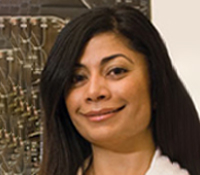
(May 2010) — Growing up in the small farm community of Caldwell, Idaho, Micaela Vargas says her mom gave her two choices—work with your hands or work with your brain. Vargas chose her brain.
That choice led her to become the first Hispanic woman to receive a Ph.D. in the cellular and molecular biology program at UTSA in December 2009.
"I thank my mom for taking me out into the cornfield," she says.
That cornfield is the last place one would expect to find an emerging young biologist, but it is exactly where Vargas, raised by a family of migrant farm workers, learned about the hard work that would get her through school. Her high school graduating class was fewer than 300 students, and the goal of pursuing a doctoral degree was far from the norm. Just leaving the town to attend college was a big accomplishment.
Just like the pursuit of education, science has been a part of Vargas' life since early childhood. In fourth grade, she didn't have expressed plans to become a scientist; she only knew that she liked to learn about how things worked. She researched how volcanoes erupted and built a classic clay model as a science project.
By the time she reached high school, her interests were focused on biology as she witnessed her grandmother battle breast cancer. "She didn't know or understand much about the disease; she only had a second-grade education," says Vargas. But her grandmother's perseverance was an example of what could be accomplished with determination. Her grandmother won the battle with cancer, but passed away just months before Vargas' doctoral graduation. Inspired by the family that raised her to dream big, she was pushed by her academic mentor to act on those dreams.
"It's a love-hate relationship, but an important one," she says of the student-mentor relationship. "It's so important for your adviser to encourage you, to get mad at you at times."
Vargas took a chance in choosing her mentor for graduate studies. Dr. Jilani Chaudry, Assistant Professor of Biology and a member of the South Texas Center for Emerging Infectious Diseases, was new to UTSA and had not even set up his laboratory when she decided to work with him. Vargas began working in Dr. Chaudry's laboratory, studying two genes in human DNA that are important both to anthrax and cancer research. She studied the genes in both normal tissue and cancerous tissue, and her analysis revealed two new forms of the genes, one of which acts as a receptor for anthrax toxin. Both genes also contain proteins important for a crucial process in tumor development and many other diseases.

